200 Days in Evin: British-Iranian Woman Jailed for Protesting
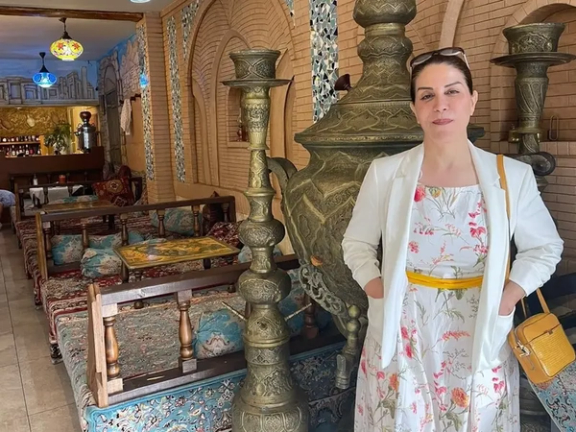
Nasrin Roshan, a British-Iranian citizen and political prisoner, has been detained in Iran for over 200 days and is serving a three-year prison sentence in Evin Prison.

Nasrin Roshan, a British-Iranian citizen and political prisoner, has been detained in Iran for over 200 days and is serving a three-year prison sentence in Evin Prison.
Roshan is suffering from joint and back pain and has been denied medical attention despite swelling in her knees and ankles. Iran International has learned that she has developed knee arthritis in prison and her physical condition has deteriorated to the point where her illness has affected her appearance and gait.
She was arrested by security forces at Imam Khomeini International Airport on November 19, 2023, while attempting to legally travel from Tehran to her country of residence, the United Kingdom. Roshan was then taken to a solitary cell in the Intelligence Ministry's detention center known as Ward 209 of Evin Prison.Section 209 of Evin Prison, reportedly the most dreadful ward of the detention facility, is one of three prison sections that are controlled by Iran’s intelligence ministry.
Sara Tabrizian, a former political prisoner who died mysteriously after being released from prison, was arrested with her. She had been summoned to the Intelligence Ministry just one day before her death.
On January 1, 2024, after about a month and a half of torture and interrogation, Roshan was transferred to the women's ward of Evin Prison, where she has remained since.
Iran has been accused of wrongfully detaining at least a dozen foreign and dual nationals on trumped up charges, effectively as hostages to extract concessions from Western governments. Most of them are held on spurious spying charges.
Roshan was later tried by Judge Iman Afshari, head of Branch 26 of the Tehran Revolutionary Court, and sentenced to four years in prison on charges of "assembly and collusion" and eight months in prison on charges of "propaganda against the system."
Under Article 134 of the Islamic Penal Code, the four-year sentence was the maximum applicable punishment, which was later reduced to three years in prison.
A source familiar with her case told Iran International that her participation in anti-regime rallies following the death of Mahsa Amini at the hands of Iran’s morality police in September 2022, outside Iran was one of the grounds cited by the court in issuing her sentence.
Arash Asiabi, Roshan’s husband, in an interview with Iran International about his wife's continued imprisonment in Iran, said: "My wife has committed no crime and does not deserve to be in prison in Iran. My wife participated in protests outside Iran, just like any conscientious Iranian who cares about their country and people. Giving voice to the Iranian people is not a crime, and she should not spend a single day in prison."
It is not Roshan’s first time inside the Islamic Republic’s prisons. Roshan, born in 1963, was imprisoned in Iran from September 1981 to September 1985, between the ages of 18 and 22.
She spent the first two months of her detention in the 1980s under interrogation and torture in Evin Prison, and the rest of her sentence in Qazal Hesar Prison in Karaj.
Now, 200 days after Roshan’s arrest in Iran, she remains in the women's ward of Evin Prison, and her husband Arash Asiabi and daughter Hasti are worried about her conditions and have been calling on the international community to pressure Iran for her immediate release.
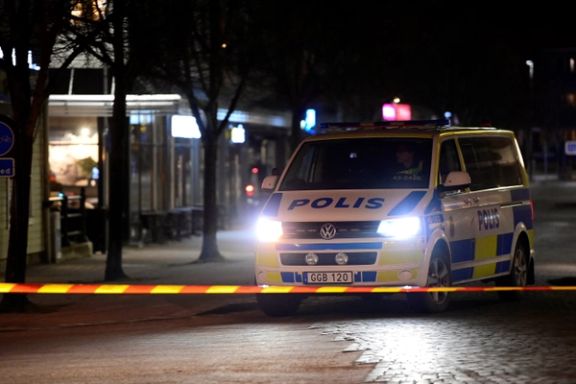
The foreboding news, “Iran is using criminal networks in Sweden,” bespoke an association between the Islamic Republic and Swedish mobsters whose targets are Jewish and Israeli.
Iran summoned Sweden's charge d'affaires in Tehran on June 1 over "baseless and biased" accusations made by a Swedish official. Sweden's security service said two days earlier that the Iranian government had been using criminal networks within Sweden to carry out violent acts against other states, groups and individuals.
Reuters has been the only leading major Western media outlet to cover this bewildering news. To hear, however, that the Iranian regime is forging bonds with Swedish gangsters is no news to those who have sounded the alarm about a pattern of behavior that in the case of the Iranian government is decades long. The Islamic Republic has had a multi-pronged affair with global gangsters using them for arms trafficking (both conventional and unconventional grade weapons) as well as money laundering.
Tehran’s favorite yardstick of governance has been mobster-like thanks to the iron fist of the praetorian IRGC in confederation with the ruling clergy. The military-industrial complex and the security-intelligence apparatus, which are pillars of its rule, operate through a complex network of religious charities and rentiering economic networks.
Thanks to JCPOA and Obama administration’s less strict approach towards Tehran, its rulers have morphologically devolved the Middle East into a complex “nexus” of armed proxies that operates akin to a mafia racket. In this context, Trump’s “maximum pressure” sanctions on their own did not disrupt the Iranian regime’s “armed proxy” and “terror network” expansionism. With President Biden taking over the White House in 2021, the regime intensified its effort to consolidate its armed regional proxy network and expanded its terror network across the globe. However, since Hamas’s October 7 attack on Israel, Iran’s efforts to recruit gangsters has accelerated by leaps and bounds.
Iran and the World Crime Syndicate: A Not-So-Secret Affair
In 2015, Peruvian officials alerted US authorities about the expansion of the IRGC Quds force’s clandestine operations into Latin America, as they bonded with the region’s drug cartel to build a network across the region. By June 2022, the special commission of money laundering of the provincial government of British Columbia, the Cullen Commission, reported on the connections between Iran’s proxy, Hezbollah, the El Chapo drug cartel and their money laundering operations in British Columbia, Canada. Putting all the available reports together, it is likely that the triad of the Latin American drug cartels, the Lebanese Hezbollah, and the IRGC are working in tandem.
The advantages of such a collaboration are manifold for those involved. Such a network joins Latin America to North Africa and the Middle East, and also avails the partners in crime with the resources available through a global money laundering network powered by Crypto Currency. A further possible advantage could be to help one another eliminate competitors and/or enemies across the world.
The Iranian network with the global crime syndicates is not limited to Latin America, but stretches all the way to East Asia. In February 2024, the US indicted Takeshi Ebisawa, a Yakuza (Japanese Mafia) boss, for conspiring to transfer uranium and weapons-grade plutonium from Myanmar to Iran.
Recruiting Global Gangsters to Target Jews and Non-Jews
In view of the decade long collaboration between the Iranian authorities and the global crime syndicate, it was just a matter of time that Tehran would seek the services of domestic franchises as far as Sweden, Canada, and the United States to commit acts of terror on its behalf.
Starting from its founding in 1979, the Islamic government assassinated Iranian dissidents in Europe and North America in the 1980s and 1990s. A 2011 study by Iran Human Rights Documentation Centre details how the regime plotted and implemented these assassination plots. The report points out that it used a combination of hired-for-murder non-Iranian hitmen as well as Iranian agents who operated clandestinely under diplomatic cover for such missions.
After a lull in the early 2000s, Tehran renewed its overseas terror plot machinery as of 2010 with renewed vigor. In 2011, it sent two clandestine agents under cover as tourists to target Israeli diplomats in Bangkok. The Thai authorities arrested the to-be-assailants after the explosives that they had stored at their residence in Bangkok blew up the roof of the house. The Iranian agents were eventually convicted for plotting to assassinate Israeli diplomats in Thailand in 2013.
In 2018, two plots were folded by the Europeans. First, the European police, through the close collaboration of Belgian, Dutch, German and French police arrested(July 2018) and eventually convicted the IRGC Quds Force Operative-Cum-diplomat, Assadollah Assadi who sought to use his diplomatic cover to commit a bomb plot against the Iranian dissidents in Europe. Shortly thereafter, the Danish police arrested a Norwegian citizen of Iranian descent that plotted to kill an Iranian separatist leader in October 2018.
Unabated, the IRGC intelligence awakened a sleeper-cell that it had dispatched to Sweden three years earlier as refugees in the persons of an Iranian couple to implement a plot to murder Swedish Jews. However, the Swedish police arrested them in April 2021 before they could accomplish their mission.
This was followed by the shooting attack on a synagogue in Essen Germany in November 2022 (18 November). The Essen shooting attack marked a departure by the Iranian security-intelligence apparatus from using Iranian nationals. In fact, the planning and implementation of the Essen Synagogue attack debuts the recruitment of local gangster franchises to implement a terror plot designed, planned, and funded by Tehran.
It was not until March 2023 that it was reported that the Iranian agents used a German citizen of Iranian descent based in Tehran to launch an attack against the synagogue in Essen. It is noteworthy that there was another attempted attack on another synagogue in Bochum on 17 November 2022. At the time, German authorities speculated that the suspect in both attacks was the same person who had acted at the instigation of an Iran-German member of Hells Angels, Ramin Yektaparast. A former president of the Hells Angels chapter in Oberhausen, Yektaparast was the mastermind of the attacks against both synagogues in November 2022. At the time, Yektaparast had already absconded Germany for Iran a year or so earlier as he was a suspect in the “Rocker-Torso Murder”. Based on reports from Israel and Europe, Israeli intelligence finally “dispatched” Yektaparast in Iran in April 2024.
The ferocity of the Iranian plots against Jewish and Israeli citizens across the world reached such heights that by September 10, 2023 (almost a month before Hamas’ attack on Israel) David Barnea, Mossad’s Chief, publicly warned the Iranian regime that if it so persisted in planning and attempting to implement such terror plots, Israel was ready to attack Iran’s top officials in Tehran.
In late January 2024, news broke that the Iranian agents hired two members of the Canadian Hells Angels to commit assassinations inside the United States against Iranian American dissidents. After their successive failures in Europe in the previous years, the IRGC and their underworld friends were still intent upon striking terror in the heart of North America.
Damion Patrick Ryan (43), one of the two Canadian Hells Angels, as mentioned in the US indictment, however, was all too familiar for those who follow organized crime news in Canada. Originally, Ryan was a member of Vancouver biker gangs. He moved to Ottawa in 2010 where he joined the Hells Angels chapter there for a few years. He later moved to Greece and joined the Hells Angels chapter in Attica. It is not clear when and how, in Canada or Greece, he became acquainted with an Iranian international drug dealer, Naji Zindashti, that acted as middleman between him and the Iranian intelligence. The US Justice Department indictment establishes that between December 2020 and March 2021, the Canadian gangsters became part of a network run by Zindashti’s criminal drug trafficking organization at the behest of the Iranian security and intelligence apparatus.
Any astute observer would notice that the recruitment of the German and Canadian Hells Angels occurred within two years (2020-2021), indicative of a premeditated design. The latest episodes of recruiting local gangsters establish the systematic nature of such efforts. The first of such episodes was in March 2024, when Peruvian authorities arrested an alleged member of the IRGC’s Quds force, Majid Azizi, along with two Peruvian accomplices. According to the official reports, the trio intended to kill an Israeli businessman.
The most recent event completing the pattern of recruiting gangsters to conduct terror attacks particularly against Israeli targets came from the Swedish authorities, confirming that Tehran has Swedish crime syndicates in its employment. The Swedish statement further confirms Mossad’s alerts that the Iran actively seeks to implement terror plots against Israeli embassies in Europe.
Though Tehran’s doctrinal shift to use gangsters as opposed to undercover agents acting as diplomats, or pretending to be refugees, seems novel, it is highly flawed. States are traditionally far more likely to extradite (with or without mutual extradition treaties) organized crime members than they would in the case of assassins that operate under diplomatic cover. Furthermore, if the number of arrests and convictions of gangsters hired by a country to act as their terror plot agents starts to surge, this could mark a new era of enforcing the counter-terrorism UN convention in an unprecedented way. The only presumable advantage for gangsters to enter such Faustian deals can be to secure themselves a safe haven from an emerging counterterrorism à la counter-organized crime regime.
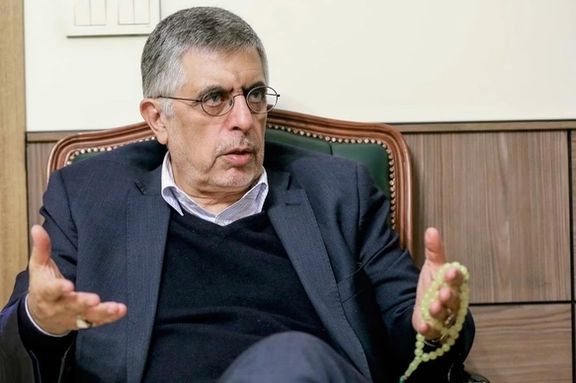
Gholamhossein Karbaschi, former mayor of Tehran, likened the mass registrations for the Iranian presidential election to a "stand-up comedy."
Karbaschi, a prominent figure in the centrist, pro-reform Executives of Construction Party, said, "They [the government] have turned the country's main symbol of democracy into a stand-up comedy," amid the sham elections which will ultimately nominate someone chosen by the country's Supreme Leader.
Karbaschi, a close ally of former President Mohammad Khatami, was previously arrested and imprisoned on corruption charges in a case that the New York Times described as "widely seen among moderates as a politically motivated attack" by conservatives and hard-liners. It was perceived as an effort to suppress Khatami's reformist agenda.
Echoing Karbaschi's sentiments, Saeed Hajarian, a reformist theorist, also voiced his concerns over the superficiality of the candidate registration for the upcoming presidential election.
On X, he criticized the absence of substance behind the spectacle: "A neat suit, a few slow steps, showing the ID card, a few camera flashes... That's it! They talk neither of a coherent plan nor of the potential members of an effective cabinet."
The debacle comes in the wake of the sudden death of President Ebrahim Raisi in a helicopter crash on May 19, which precipitated the current snap election set for June 28. With registration ongoing since Thursday and ending Monday, nearly 90 percent of the candidates hail from the pro-regime camp.
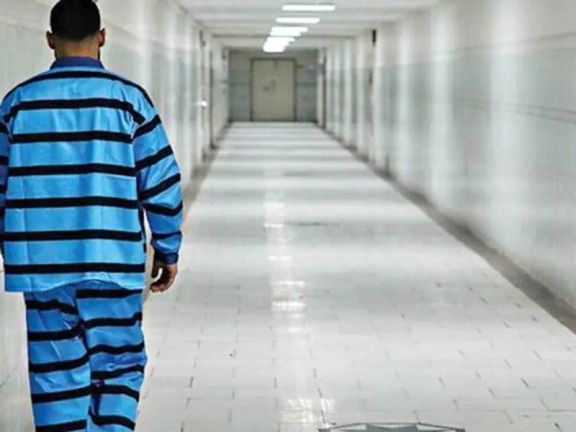
Adham Naroui, a political prisoner facing the death penalty in Iran's Zahedan Prison, attempted suicide on Thursday amid fears of imminent execution.
According to Haalvash, a news outlet covering the Sistan-Baluchestan province, Naroui was rushed to a local hospital after overdosing on sedatives. He is the latest prisoner to attempt suicide amid Iran's escalating killing spree, last year alone, over 850 Iranians executed.
Naroui, arrested by security forces in June 2021 in Lashar, and later transferred to Zahedan, was charged along with Mohammad Zeinoddini in October 2020. In 2022, both were convicted of "waging war through armed action" and their death sentences were upheld by the Supreme Court in November 2023.
They were accused of murdering three members of the Revolutionary Guard during an operation, charges they have repeatedly denied, claiming they played no role in the incident.
The incident is part of a broader pattern of neglect and abuse in Iranian prisons, which the US-based Human Rights Activists News Agency (HRANA) highlights in its annual report saying between March 2023 and March 2024, at least six prisoners died due to illness, twenty committed suicide, and eight were murdered in custody.
The report details physical torture, denial of medical services, solitary confinement, forced confessions, lack of access to chosen lawyers, and inappropriate detention conditions endured by political prisoners.
Iran has consistently failed to acknowledge responsibility for the deaths and suffering of political prisoners caused by torture, lack of medical care, and other forms of systemic abuse.
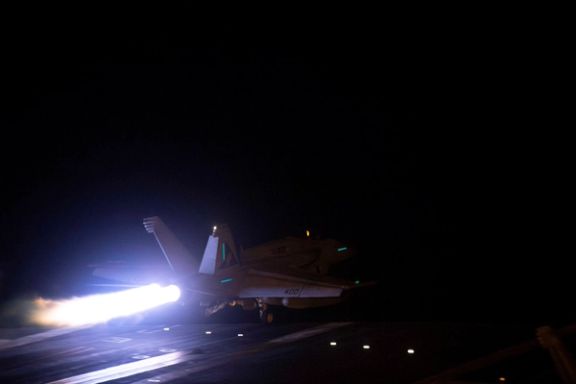
A British think-tank has claimed the UK should launch direct attacks on Iran after current international policy and sanctions have “failed spectacularly”.
According to The Henry Jackson Society, the West’s policy on Iran is “in tatters”. Iran continues to support Russia’s war on Ukraine, bolster its nuclear capabilities, fund, train and arm militias in the Middle East and most recently, target international shipping through its Yemeni proxy, the Houthis, in the Red Sea region.
The blockade, which the Houthis say is in allegiance with Iran-backed Hamas in Gaza amid its war with Israel, has seen the Houthis “taking hostages, seizing ships, firing missiles at US military vessels and firing missiles and drones at Saudi Arabia via Yemen”, according to the report.
Dozens of hostages hail from countries such as Mexico, Romania and the Philippines, though the Houthis allege they are targeting Israeli-linked vessels. However, that expanded to Western backed vessels after retaliatory attacks from a UK-US coalition directly attacked Houthi facilities in Yemen. Since last year, Iran has also ramped up its policy of diplomatic hostage-taking, including European diplomat Johan Floderus. In spite of this, President Joe Biden freed up $6bn of frozen Iranian funds in South Korea last year in exchange for the release of five US-Iranian hostages, only showing the success of Iran's policy.
“For too long, Iranian aggression has been unchallenged,” the report said, suggesting direct attacks on the likes of Iran’s drone and missile facilities which have been used to arm Russia in addition to Iran’s regional proxies, as well as targeting Iran’s air defences.
Its experts claim that the US should remove its carriers from the Persian Gulf, granting the US strike capability while insulating them from drones, mines and anti-ship missiles. It also suggests targeting Islamic Revolutionary Guard Corps (IRGC) bases such as the Pasdaran base and senior IRGC personnel on Iranian or foreign soil.
Since the Gaza war alone, sparked in October by Iran-backed Hamas’s invasion of Israel, over 200 attacks on US facilities in the Middle East as punishment for supporting Israel’s right to defend itself, have all but passed with no response. Just a handful of retaliatory attacks have been launched, none of which touched Iran directly.
“Even when the US has been directly targeted by Iranian proxies, successive administrations have refused to respond directly to Iran and hold the regime accountable,” the report stated, attacks happening in the likes of Iraq and Yemen, with three US forces killed in Jordan, 47 others wounded.
Taking a softly softly approach, pursuing diplomatic means and secret, though indirect, talks instead of military options, “the strategy was to localise conflict, avoid regional escalation and prevent broader war from breaking out in the Middle East. Ironically, it has led to the exact opposite. By attempting to prevent war, the US has encouraged conflict to erupt,” said the report.
Targeting Iran's nuclear program is essential, claims the think-tank. Under the Biden administration, Tehran has only continued to become more emboldened, escalating its nuclear enrichment, in spite of sanctions, even blocking access to the UN's inspectors. UN nuclear chief, Rafael Grossi, recently said Iran is now weeks, not months, away from a nuclear weapon.
While Iran continues to bypass sanctions, selling oil to countries such as China, the think tank also suggests targeting Iran’s oil infrastructure, including refining and processing facilities, domestic distribution pipelines and terminals, and the hydrocarbon export ports.
State-backed plots to assassinate Israelis and Jews abroad continue to be seen from South America to Europe, including the UK’s national security agency, MI5, calling Iran one of the biggest foreign threats on UK soil. Just days ago, Israel’s intelligence agency, Mossad, revealed plots across Europe targeting Israeli embassies.
Multiple Iran International journalists have also been targeted in assassination attempts in the UK. Most recently, journalist Pouria Zeraati, was stabbed in public on a London street, as targeting Iranian dissidents in exile becomes ever more brazen policy from the regime.
The Henry Jackson Society report also calls for a “new policy towards Iran” which would involve Israel “expanding its projection of power to target Iranian facilities on Iranian soil, and could be accompanied by the US conducting disproportionate responses to destabilise the Iranian regime with the effect of paradoxically restoring deterrence”.
After an alleged Israeli airstrike on the Iranian consulate in Syria in April, targeting senior military figures at what has been claimed is a consulate covering as a military facility, Tehran launched its first direct assault on Israel.
Over 350 projectiles were launched towards the Jewish state, with Israel and a US-led coalition intercepting the majority. However, there was no international military action against Iran for the attack which risked the beginnings of a third world war, with Biden only putting distance between the US and Israel after the event, warning Israel it would not be involved in further action.
But it is not only Biden who has come under fire for being too soft on Iran. Last week, a group of over 550 British MPs and peers joined forces to call for the proscription of Iran’s Revolutionary Guard as unlike the US, the UK resists designating Iran’s state-backed terror force in favor of ‘diplomatic means’.
Tory MP Bob Blackman said: “We have tried the current policy of appeasement for 40 years, and it has only resulted in failure after failure, simply emboldening the regime in intensifying its nefarious conduct.
“It should be coupled with holding the regime accountable, including by designating the IRGC as a terrorist entity, a step long overdue. That would send a clear message to the ayatollahs that business as usual is over and would signal to the brave Iranians that the West has started to be on their side.”
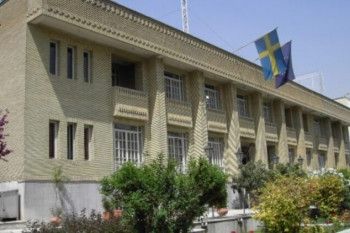
The Swedish temporary chargé d'affaires in Tehran was summoned by the Iranian foreign ministry on Saturday, accused of spreading "baseless and malicious accusations against Iran."
Daniel Stenling, the head of counter intelligence at the Swedish Security Service, revealed at a news conference on Thursday that the plots are proxies for the Iranian government.
The groups have reportedly targeted Israeli interests and Iranian dissidents within Sweden. "The Security Service can now confirm that criminal networks in Sweden are proxies that Iran uses," Stenling stated, supported by news revealed by Israel's intelligence services Thursday of terror plots across Europe including Belgium and Sweden against Jewish and Israeli targets.
Sweden's Foreign Minister Tobias Billstrom said, "It is deeply worrying that a foreign power, in this case Iran, should have used criminal networks to commit or instigate crimes in Sweden."
Iran has held Swedish EU diplomat Johan Floderus hostage since last year, part of its ongoing policy of diplomatic hostage taking, accusing him of espionage.